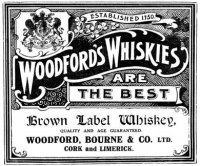


 |
 |
 |
|
|
|
|
14 –17 April, 2010
|
Papers are invited on any aspect of Joyce’s relationship to the nineteenth century or on topics germane to the ‘Consumer Culture, Advertising and Literature in Ireland, 1848-1921’ project. Issues may include: • Joyce and 19th Century Ireland (its history, politics and literature) Enquiries and abstracts:john.nash@durham.ac.uk To register see below. |
||
 |
Joyce’s position as a key figure within modernism and as a formative influence in modern Irish and European culture is assured. His work has long been understood as anticipating so much that seemingly ‘followed’, from Irish Independence to deconstruction and postmodern globalisation. Derrida describes how it is “always too late with Joyce” since he anticipates and even “invents” us. The famous opening to Richard Ellmann’s 1959 biography - “We are still learning to be James Joyce’s contemporaries” – itself heralded a late-twentieth century reading of modernism as avant la lettre. Even as far back as 1920, in The Dial, Joyce was hailed as a ‘Contemporary of the Future’. But what was Joyce’s relationship with the nineteenth century (into which he was born and educated)? How should that relationship be thought in light of the persistence of his contemporaneity? How was the modernity of Joyce, and of us, already a feature of the 19th century? In what ways does modernity carry its own uneven conditions? Can we say with assurance that the 19th century was an age that ‘preceded’ him? How have the major intellectual and historical factors of the period – such as the growth of capital and commodity culture, liberalism and technology, gender and imperial politics, decentered subjectivity, etc. – been both necessary and contingent in our formulation of Joyce? By putting Joyce back into the nineteenth century, and by putting the nineteenth century back into Joyce, we hope to re-read some of the major cultural developments of ‘our times’. |
In association with the Leverhulme-funded project ‘Consumer Culture, Advertising and Literature in Ireland,1848-1921’, this international and interdisciplinary conference, to be held at St. Chad’s College, Durham University, will address these and related questions. The conference will feature several high profile keynote speakers: Anne Fogarty, Luke Gibbons, Andrew Gibson, Emer Nolan and Jennifer Wicke and will result in a major new volume of essays. Registration To register as an attendee, please download, print and complete this PDF registration form and return it with payment to the address shown on the form. |
 |
Contact Us
|
|
| To contact the project, please e-mail Professor John Strachan. |
Maintained by Road Ahead / Contact Webmaster / Last updated
June 28, 2011
/ Visitor Number:
(Stats) |